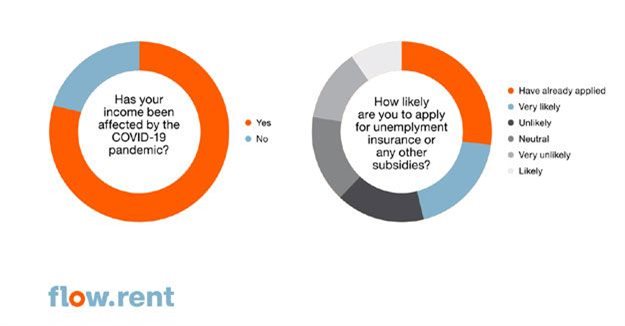Both the high end (rentals of R12,000+ per month) and low end (rentals R2,000 – R3,999 per month) of the market are affected – indicating that no part of the rental market has escaped rental affordability damage. “This is, of course, also a major risk to landlords, who are used to high risk tenants representing just a fraction of their portfolio,” says Flow co-founder and CEO Gil Sperling.
“Landlords who are receiving partial payments are at risk of tenants stopping the payment of rent altogether as their savings are depleted and credit lines maxed out. 49% of participants in the survey are certain that the negative monetary effects of the lockdown will last longer than three months. 42.72% are relying on their salaries to pay their rent, 30.09%, their savings and 21.6% are relying on loans.”

Flow co-founder and CEO Gil Sperling
With 78.8% of participating tenants’ income affected by Covid-19, 55% of respondents said they have either already applied or intend to apply for financial assistance to help pay their bills. Landlords have accommodated 35% of renters with reduced or waived rent. Individual landlords have proven to be more forgiving, with 44% agreeing to waive or reduce rental payments, with 24% of companies and trusts doing the same.
Unpacking the results
The FlowFindings results were unpacked during a webinar on 20 May, featuring Sperling, Pam Golding Properties CEO Andrew Golding, Just Property CEO Paul Stevens, Ithemba Property Management CEO Paul Schaefer, Trafalgar Property Management MD Andrew Schaefe, and Dexter Leite, manager: rentals at Pam Golding Properties.
Golding says that it’s hard to predict the impact of the lockdown on both sales and rentals, as it’s still early days. “We’re currently seeing a situation where 20% of our tenants are not able to pay their rent. People are having to find creative ways to pay what they can – borrowing from friends or family or extending the terms of personal loans,” he says.
“What we can say is that the market is in for a significant reset. Signs are that the volume of sales is set to drop by 50%, with owners who aren’t forced to sell not putting their properties on the market. It’s definitely going to be a buyers’ market, with plenty of opportunities for those who are placed to be opportunistic.”
Golding says that the few sales they have pushed through under lockdown have been on aggressive offers by as much as 25% below the pre-lockdown listing price. “Our best guess is that prices will contract by 15-20%. We’re going to see more people looking at renting than buying, from an affordability perspective, which will put downward pressure on rental levels,” he says.
Moving post lockdown
The FlowFindings results indicated that lockdown forced 88.47% of tenants to stay in their rental homes during lockdown, with 17% having had intentions of moving from their current residence before lockdown started. Having faced a variety of challenges during lockdown, 32% of tenants have indicated that they’re likely to move out after lockdown – 12.63% of those due to their lease ending, 50.93% due to lockdown-related affordability issues and 15.11% of them due to general affordability issues.
“In a typical month, the rental market sees 5% of tenants moving. Due to lockdown restrictions, there’s been a huge spike in tenants staying in their current rental homes for much longer than usual – but we expect a far higher than average number of tenants moving post-lockdown – which will cause a huge bottleneck,” says Sperling.
Schaefer says that the rental market was already under pressure before lockdown, and things have only gotten worse.
“How do landlords plan ahead when tenants aren’t able to make payments if their income has been affected? They won’t be able to catch up with their arrears any time soon, so we need to consider how this all clears through the system. We believe that rental credits are the only way forward,” he says.
Business owners among hardest hit
Stevens concurs, with rentals down as far back as the end of 2019. “Annual escalations are stagnant and we’re looking at a possible reversion of rental amounts,” he says. “It’s not only the middle-class being affected – it’s hitting everywhere. Business owners are amongst the hardest hit, with responsibilities to keep their staff paid and pay rentals at the top end of the market.”
Leite says that it’s difficult for landlords to perform in lockdown as they can’t visit the properties for inspections, making it difficult to attend to maintenance issues at this stage.
View a recording of the webinar and access the full FlowFindings report here.






























